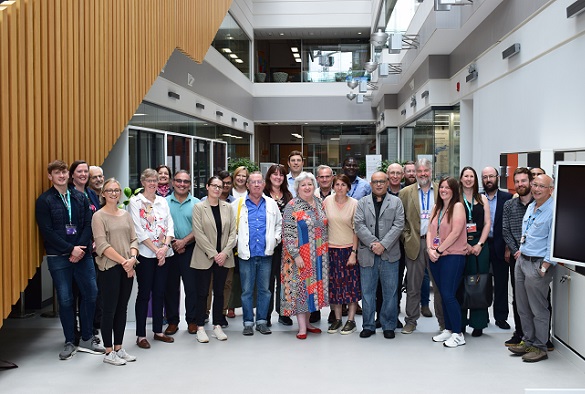Major funding extension to advance revolutionary long-acting therapeutic technologies
Published on

Unitaid has awarded more than £6M of new funding to a University of Liverpool-led project aiming to improve the long-acting therapeutics available to treat or prevent tuberculosis, malaria and hepatitis C.
The LONGEVITY project started in 2020 and has already accomplished preclinical proof of concept for long-acting medications for tuberculosis, and for hepatitis C virus therapy. The primary motivation of LONGEVITY researchers is ensuring these therapeutics are easily accessible in low- and middle- income countries (LMICs).
LONGEVITY is part of the University of Liverpool’s Centre of Excellence for Long-acting Therapeutics (CELT), a cross-faculty research initiative combining world leading expertise in pharmacology and materials chemistry and working with international partners to disseminate research findings in long-acting medicine and change the global landscape of drug administration.
This extension funding of US $7.9 million will enable a number of additional activities to ensure that CELT continues to address the specific needs and opportunities available for LMIC contexts, including:
• Pharmacometrics tools to facilitate development and deployment of long-acting technologies, such as Teoreler, a free modelling software created within the CELT team that simulates physiologically based pharmacokinetics with models available for adults, children and drug-drug interaction.
• Optimising programmatic outcomes through implementation research, such as working with Liverpool School of Tropical Medicine (LSTM) for greater understanding of in-country supply chain, and linkages between country drug demands.
• Working closely with The Medicines Patent Pool (MPP) to explore the gaps in current therapies that could be mitigated with long-acting formulations, including for paediatric populations.
• Developing an informed understanding of manufacturing capability of generics manufacturers for established and emerging long-acting technologies.
• Establishing a community of practice for long-acting therapeutics in perinatal and paediatric health.
Professor Andrew Owen, principal investigator for the LONGEVITY project and co-director of CELT said: “We are proud to work with our passionate and dedicated colleagues at Unitaid in the continued implementation of the LONGEVITY project. Long-acting medicines hold enormous promise to address challenges in treatment and prevention of infectious diseases in low- and middle- income countries. The additional investment in CELT will help us to broadly address challenges associated with equitable development and deployment of long-acting medicines.”
Professor Steve Rannard, materials chemist and co-director of CELT said: “The opportunity to work with Unitaid and our global LONGEVITY consortium partners to help to address unmet medical needs is a huge privilege. We are very excited to move to the next phase of the programme and demonstrate the benefits of our long-acting candidates in human studies."
Professor Wiebe Van Der Hoek, Executive Pro-Vice-Chancellor of the Faculty of Science and Engineering said: "The CELT team has now secured an extension to develop long-acting injectables for tuberculosis infection and hepatitis C, while exploratory work will start on Microarray Patches. What is particularly exciting about the work of CELT is its cross-Departmental and indeed cross-Faculty nature, showing the benefits of multidisciplinary activities combined with a compelling team vision, producing excellent research outputs and great impact through health benefits worldwide.”
Professor Louise Kenny, Executive Pro-Vice-Chancellor of the Faculty of Health and Life Sciences said: “We are exceptionally proud of the UNITAID funded Longevity programme and the team at CELT. This work is truly at the forefront of innovation in drug delivery and the impact is striking; long-acting drug delivery systems are proving to be a key line of defence in global threats such as antimicrobial resistance (AMR) and in addressing the previously unmet needs of vulnerable populations. This programme involves colleagues from across the university and is a world class and inspirational example of inter-disciplinary team science at its best.”
Professor Tariq Ali, Pro-Vice-Chancellor for Global Engagement and Partnerships at the University of Liverpool said: “I am delighted and proud that, in collaboration with international partners, CELT can continue this vital work to improve access to long-acting therapeutics in low- and middle-income countries. The Longevity project and its significant impact on people’s lives on an international scale make an important contribution to the University of Liverpool’s global strategic ambitions.”
The CELT/LONGEVITY team are in the process of planning their involvement with Liverpool City Region’s Life Science Investment Zone. This is the UK’s second Investment Zone and aims to enhance capabilities and facilities to attract further inward investment - boosting innovation and creating over 4,000 jobs.